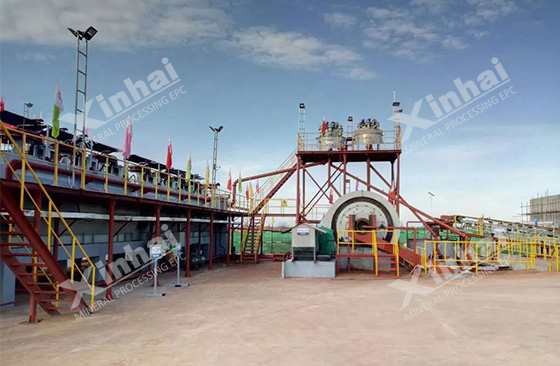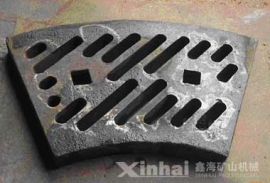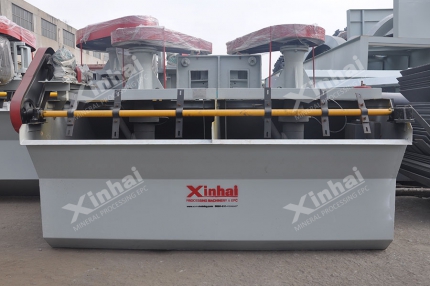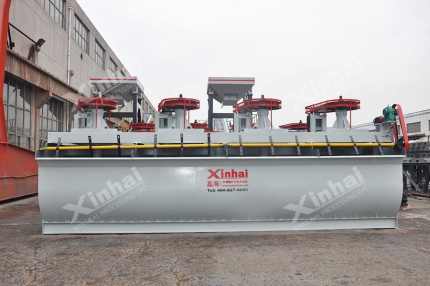Barite is a barium-containing sulfate mineral, widely used in petroleum, chemical industry, light industry, metallurgy, medicine, agriculture, atomic energy, military and other fields. It has stable properties and is an important non-metallic mineral raw material. With the gradual depletion of single-type barite mines, barite minerals associated with other metal ores and non-metallic minerals have become the focus of barite development. The associated components of these barite minerals are complex and closely related. It is also more complicated. This article will take you to understand the common barite beneficiation processing technology.

Use the table of contents below to navigate through the guide:
01Barite gravity separation method
According to the difference in density between barite and associated minerals, the gravity separation method undergoes process steps such as washing and screening, crushing, grading and desliming, jigging separation, and shaking table separation to obtain concentrated ore products. The gravity separation method is mostly used for residual ores, and concentrates with grades above 80% can be obtained.
Different particle sizes of barite have different requirements for beneficiation equipment. When the particle size of barite embedding is larger than 2mm, dense medium separation and jigging separation are usually used for separation. Among them, the upper limit of particle size of dense medium separation is 50mm, and the upper limit of particle size of wet and jigging separation is about 20mm. The barite minerals with a particle size of less than 2mm can be sorted by a shaker or a spiral classifier, and a hydrocyclone can be used in the stage before beneficiation to remove the mud in the ore and improve the beneficiation effect.

02Barite magnetic separation method
Magnetic separation is often used to remove iron oxide magnetic minerals in barite, such as siderite, etc. Barite products processed by this method can be used as barite raw materials for basic medicines with very low iron content. Dry strong magnetic separator and wet high gradient strong magnetic separator can be used to process barite minerals with fine particle size and remove impurities with weak magnetic properties.
03Barite flotation separation method
The flotation separation method is mainly used to deal with the barite ore with very fine particle size and the tailings of barite gravity separation. According to different collectors, it can be divided into two types, one is the chemical adsorption form, which uses anionic collectors such as fatty acid alkyl sulfate and alkyl sulfonate; the other is the physical adsorption form, which uses cationic amines collector. Amine collectors have low collection efficiency and are extremely sensitive to the impact of ore slime, so it is ideal to use anion collectors.

Usually, sodium hydroxide is added to the ball mill to adjust the pH value to 8-10, water glass is used as the medium regulator, and oleic acid collector is used for flotation under the condition of solid concentration of 30%-40%. This method is often used in sedimentary barite ore and hydrothermal ore associated with minerals such as sulfide ore and fluorite.
04Barite chemical beneficiation method
Chemical beneficiation is mainly used to remove carbon, iron, manganese, vanadium, nickel and other impurities in barite. The method can also be subdivided into acid leaching method, oxidation method, oxidation-reduction method and so on.
The acid leaching method utilizes the reaction between acid and the metal or metal oxides attached to the surface of barite minerals to generate compounds soluble in water or dilute acid, and then filtered and washed to separate the solubles, so as to achieve impurity removal and purification The commonly used leaching agents are sulfuric acid, hydrochloric acid, etc.
The oxidation method is to use oxidants to oxidize the associated iron minerals in barite minerals into soluble iron salts, and at the same time oxidize organic matter to turn them into colorless oxides that are easily washed away. Commonly used oxidants include hydrogen peroxide, sodium hypochlorite, etc. .
The oxidation-reduction reaction method is to use the oxidant to react with barite first, dissolve the coloring substance, and then add the reducing agent sodium dithionite or sodium thiosulfate to reduce the impurity ferric ions to ferrous ions, and then filter and wash to achieve purification and whitening purposes.

The above are common barite beneficiation and processing methods. Different uses of barite have different requirements on purity, whiteness and impurities, and there are differences in the selection of beneficiation and processing methods. Investment costs, product benefits, etc. need to be considered comprehensively. To choose from many aspects, it is recommended that the mine owner conduct a mineral processing test before choosing a mineral processing method, and choose a suitable process method according to the test results to achieve ideal economic benefits.


 marketing@ytxinhai.com
marketing@ytxinhai.com  0086 13810327080
0086 13810327080 






































































































 CHAT
CHAT MESSAGE
MESSAGE






